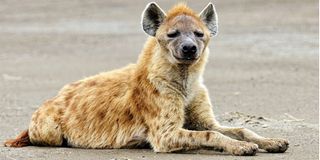No help in sight, as hyenas continue to ravage Njoro residents

A hyena at Lake Nakuru National Park.
Three weeks after residents of Njoro voiced their frustrations over repeated hyena attacks, the problem continues to trouble the community.
During his visit in Njoro on August 1, Deputy President Kithure Kindiki tasked the Kenya Wildlife Service (KWS) to curb the escalating hyena menace. However, the residents’ hopes are fading by the day as a recent attack has been recorded, just two days ago.
Before this, 14-year-old Joseph Mwangi, went missing on July 17. His remains were found in a maize farm, suspected to have been the aftermath of a brutal hyena attack.
The rest of his body has not yet been recovered.
In a phone interview with Mtaa Wangu, Sinendet Location Chief Lewis Kiarahu, acknowledged that KWS has been quick to respond whenever called, but stressed that the attacks persist.
“Two days ago, we recorded a hyena attack in a homestead where it killed a sheep. The matter was reported, and a compensation form was filled,” Kiarahu says.
He added that, through collaboration with KWS and the community, at least four hyenas have been captured and returned to the park.
Sadly, some still roam the farms at night and return to the park in the morning. The chief also revealed that a hyena was recently found dead within the community, with the cause of death unclear.
In his remarks, Lake Nakuru National Park Warden Gideon Kebate, however, holds a different view of the situation.
He starts by saying not all hyenas making attacks in the community are from the Park. He states some are from Mau forest while others might be from the park.
“I think currently there’s no problem. I have not had many reports, and I believe the matter has largely been addressed. Only a handful of incidents had been recorded, around three or four, including the one under investigation where a young boy was reportedly killed by a hyena," Kebate notes.
On the issue of compensation, Kebate clarified that KWS does not directly pay victims, but acts as a link between affected residents and the National Treasury.
“We follow a set procedure from the time of the incident to when funds are approved by Parliament. It’s a long process, dependent on available budget. Nakuru has had a backlog from previous years that have not been tackled. However, just last week, some of the paperwork was concluded and we hope Nakuru county will be next in compensation as other counties have started receiving compensation,” he explains.
While in Nakuru during the Jukwaa La Usalama (A baraza organised by the Ministry of Interior), Interior CS Kipchumba Murkomen echoed a positive view, saying KWS has done a decent job in handling compensation for victims of human-wildlife conflict.
Kebate also emphasized that KWS response teams operate 24/7 and have been quick to react to incidents, even though no exact figures were available on how many hyenas have been successfully returned to the park.
He acknowledged that complaints are inevitable in human-wildlife conflict but insisted that “much has been done” to address the situation, with technology such as predator lights being introduced to mitigate future attacks.


